Items
Tag is exactly
inflation
-
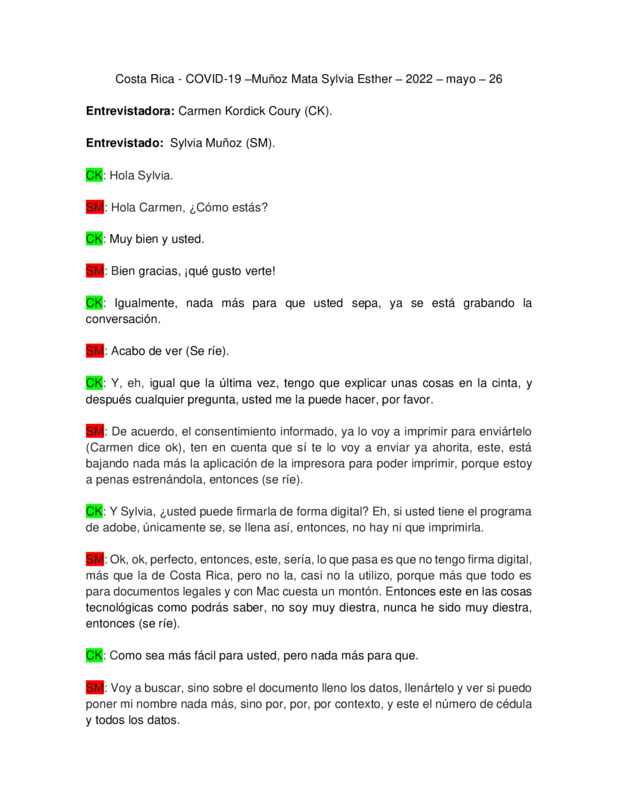 05/26/2022
05/26/2022Silvia Muñoz Mata Oral History, 2022/05/26
En esta entrevista Silvia Muñoz Mata es entrevistada por Carmen Kordick Coury concerniente al covid-19 en Costa Rica. Para empezar, Silvia habla de las cosas que habían cambiado desde el año anterior. Habla de su hogar y como se sintió cuando se enfermó. De la vacuna, teorías conspirativas, y del gene antivacunas incluyendo su novio. De allí, Silvia habla de su trabajo, de la salud mental, el abuso y violencia doméstica. Hablan de cuestiones sociales y el tema de la economía, gente sin trabajo y inflación. Pasan el tema de la inflación, la política, las elecciones y los candidatos. También hablan del gobierno, pensiones de lujo, hospitales y salud y el uso de las mascarillas. Para terminar, hablan de las fuentes principales de información y del futuro. -
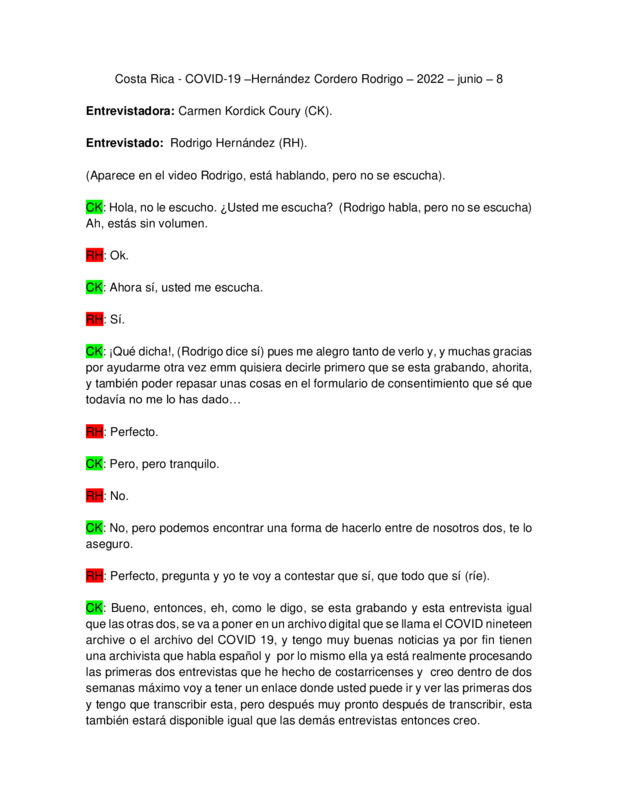 06/08/2022
06/08/2022Rodrigo Hernández Cordero Oral History, 2022/06/08
En esta entrevista Rodrigo Hernández Cordero es entrevistada por Carmen Kordick Coury concerniente al covid-19 en Costa Rica. Para empezar, hablaron de cosas que han cambiado desde el ano anterior. Hablaron de su negocio, inflación, y el gobierno. De allí hablaron del gobierno, la vacuna, y la mascarilla. Hablaron de La Caja, su vida social, y su familia. De las elecciones, fuentes principales de noticias y estudios cerebrales. Para terminar, hablaron de la juventud y de sus pensamientos del futuro. -
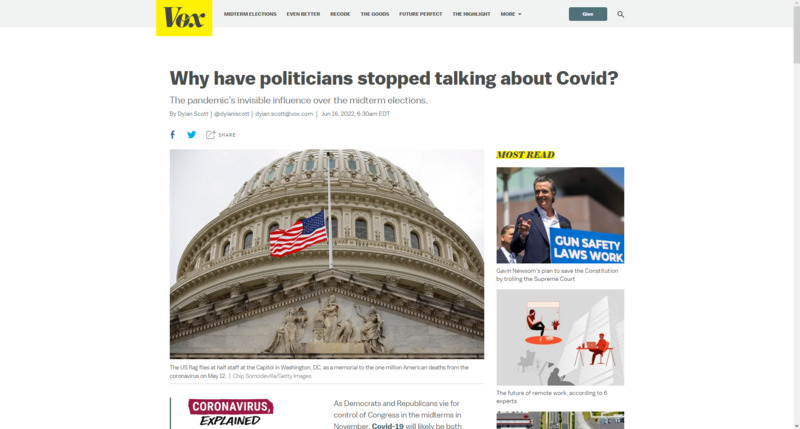 2022-06-16
2022-06-16Why have politicians stopped talking about Covid?
This is a text story from Vox by Dylan Scott. The article claims that COVID helped sink President Donald Trump's re-election campaign, yet despite this, it is not being focused on by either party. Though, this author believes the Democrat response hasn't been much better, with people not really touting President Joe Biden's vaccine rollout and other initiatives. The author links the reason for inflation being COVID interrupting supply lines, which is on people's minds for this midterm election. According to Gallup polling, COVID has lost importance in many people's minds, with it falling behind Russia and gas prices. On the Republican side of things, COVID is rarely mentioned, and if it is, it is in a negative light. Scott says that candidates favored by Donald Trump have gone against his ideas, with them being more skeptical of vaccines, and some refusing to get the vaccine at all. COVID is being tied to an anti-establishment attitude that has been rising within the Republican party. As for my own opinion on this piece, I believe that is does bring up an interesting point with linking COVID to current inflation. I do agree that COVID has impacted the economy for the worst with supply chains being more limited and rising spending of the federal government to counter it, but I do not think it can explain everything. Federal spending in general has been on an increase, which is driving up the cost of items, and not all that spending is COVID related. In addition to that, the shutdown of important pipelines has made reliance on foreign oil more of a necessity, which then drives up gas prices. These types of decisions can't all be traced back to COVID. So while I do think COVID has impacted the economy, I do not think it explains nearly all the economic issues the United States is facing. -
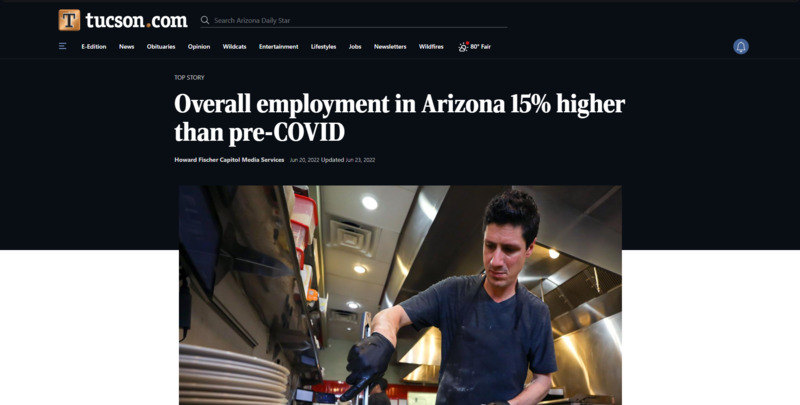 2022-06-16
2022-06-16Overall employment in Arizona 15% higher than pre-COVID
This is a news story from Tuscon.com. Overall, employment has risen by 15% compared to pre-COVID numbers. Bars, restaurants, and hotels have increased employment by 10.6% since last year. Permits issued for single and multi-family homes are down by about 16% compared to last year. There is also a 32.6% price increase on energy prices, being driven by rising gasoline prices. Overall, this article shows economic trends in Arizona and how COVID has impacted various industries and consumer trends. -
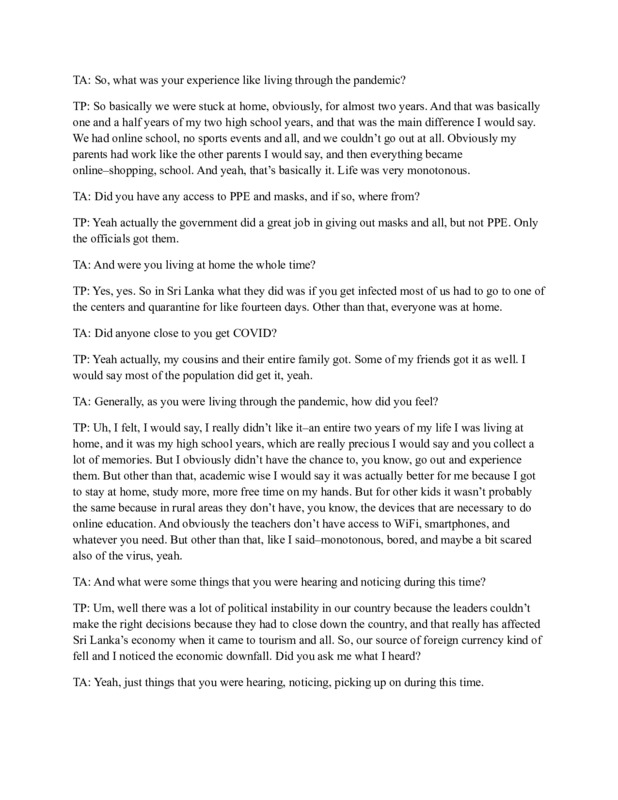 2022-05-04
2022-05-04Experiencing the Pandemic as a Student in Sri Lanka
It provides the pandemic perspective of a student from Colombo, Sri Lanka. -
2022-04-29
My Timewarp
It started for me when I returned from a business trip in Europe in March 2020. I had to fly through Germany to get home. Early in the pandemic a new country got added to the no-fly list. When I got back home, I went to work for a few days and then was told from my manager that Germany just got put on the list that if you have been there, you had to quarantine, so I couldn't come to work even though I had already been there for 3 days. So, I worked from home the rest of the week. The next week was spring break and I had it off anyway. We had plans to go to Disneyland. We decided to go and had a two-day pass. We went to the park Thursday and were resting Friday and planned to use our second pass the next day when we got notified through the Disney App that the next day would be the last day the park would be open. Almost 10 minutes later our church sent an email that services would be cancelled for the foreseeable future. My husband and I decided it was best to go home even though we still had a day at Disney. It was sinking in that this wasn’t just a few days of inconvenience. It was serious and we should head home. The next few months were hectic, scary, annoying and lonely. My son was in kindergarten and had to miss a lot of first milestones. School at home for a Kindergartner was a joke, but the time we got to spend time together as a family was nice. My work was accommodating and provided everything I needed at home. Two years later I am still working from home. I gained 15 pounds but I am back to what I was when this all started. Things are getting back to normal now, but inflation is insane and the supply chain is a nightmare. I spent some of the evening today searching for formula for my sister-in-law in Utah. A formula shortage. Something as vital as feeding babies is hard to find. Additionally, Russia invaded Ukraine just over a month ago, so even though the pandemic has settled down, the world hasn’t. God bless us. -
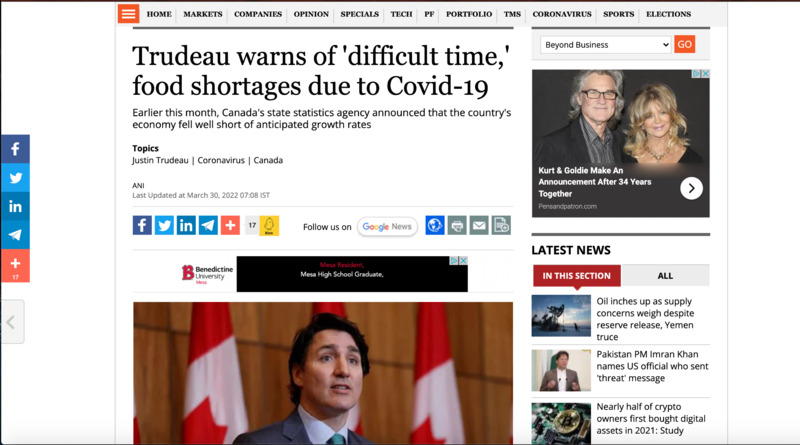 2022-03-30
2022-03-30Trudeau warns of 'difficult time,' food shortages due to Covid-19
This is a news story from the Business Standard. This is about the after effects of COVID on the Canadian population. Prime Minister Justin Trudeau warns that it will be a difficult time with food shortages due to COVID. Some of the blame for the food shortages is also placed on Russia's invasion of Ukraine. Similar tactics of blaming President Vladimir Putin for the rising prices of goods has also been used by President Joe Biden. The global disruption of supply chains results in higher prices of necessities. Earlier in March, the Canadian government announced that the economy fell short of its anticipated growth for that month. In February, inflation in Canada rose by 5.7%, the highest increase since August 1991. -
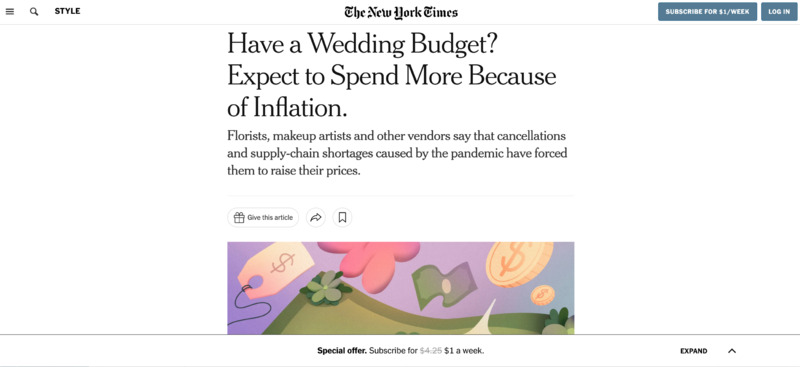 2022-03-30
2022-03-30Have a Wedding Budget? Expect to Spend More Because of Inflation
This story from the New York Times by Danielle Braff talks about the rising costs of weddings as a result from COVID. Couples mentioned in this story go on about how just the basics are more expensive than they used to be. Ms. Alvear-Beceiro and Mr. Klebba, despite not spending extra on things like food, decorations, and music, had a wedding budget that topped $30,000. Zola, a wedding planning site, said that a third of the 468 participating vendors had losses of $50,000 or more due to couples postponing weddings in 2020. Supply chain shortages later on have also helped increase the overall costs, and many businesses are still trying to operate to pre-pandemic levels. Due to rising costs, some couples are choosing to scale back the festivities. Shannon Bernadin, after looking at the costs of wedding venues with her husband, decided to have a wedding at a friend's house and use thrifted outfits, along with homemade decor. All in all, this article demonstrates the changing economy and how that has impacted the wedding industry and how people plan weddings. -
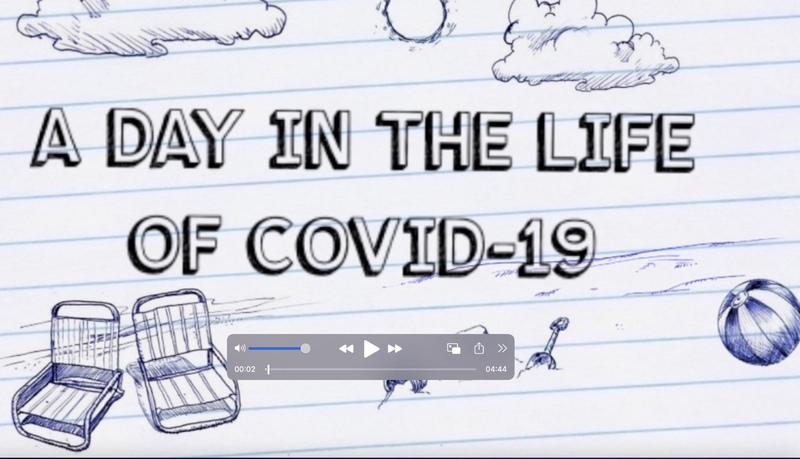 2022-03-16
2022-03-16Navigating through COVID-19: A Personal Vlog of Ashley Hampton
Spend a day with me as you see me (Ashley Hampton) navigate through a normal day in present COVID-19 in Anderson, South Carolina. I vlog about my workplace, shopping centers, and businesses in Anderson to give perspective of how COVID-19 has changed the way these institutions function on a day-to-day basis. Despite statewide coverage, not much is documented about South Carolina and COVID-19 in this archive, let alone, residential experiences. The objective of this video is added to the South Carolina COVID archive as well as highlight how personal experiences with COVID-19 may vary depending on which region you live in and community. -
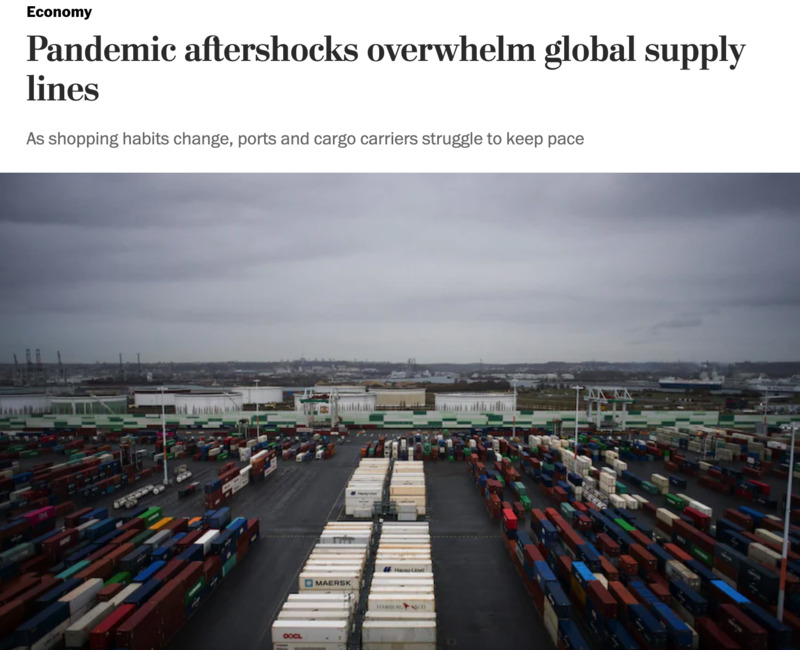 2021-01-24
2021-01-24Pandemic aftershocks overwhelm global supply lines
The Washington Post article discusses the disruptions in the supply chain and the repercussions such as inflated prices, failure to meet schedules, and effects on different industries. The domino effect was set off by the pandemic but we continue to see the fallout. Shipping artwork is a cost that galleries, advisories, collectors, and museums have to factor into their finances. Inflation in the cost of international shipping in particular and unpredictable delays negative effect openings and coordinating with clients and vendors. -
2021-10-06
COVID-19: The Impact of Power, Gender, Race, and Religion
Life during the COVID-19 pandemic is something that no one could have expected or prepared for. The way that our everyday lives instantly got disrupted and for many people their lives turned completely upside-down. We went from going to concerts, shows, and movies with friends and family, to lockdown in a brief second. Yet, for everyone lockdown, quarantine, and even work all looked different. There were many factors that went into trying to be able to stay safe and healthy during this time. Not everyone had the same advantages to try and protected themselves and their loved ones; some of the driving forces behind the advantages or disadvantage were power, gender, race, and religion. The more power, money, influence that you had during 2020 was what could almost guarantee that you and your family would be okay. By having money and power one was able to by as many masks as they wanted or by as much disinfectant as they could. Those people didn’t need to worry about if they could afford the inflated prices of hand sanitizers and Clorox wipes (if they could be found). Having power and money meant having information and accesses. This meant that those who possessed these things, could have accesses to doctors for healthcare purposes but also to get information about what was happening in their local area. With the possession of money also came space. Besides disinfectants and good masks such as N95s or KN95s, space was the next most luxurious thing people could have. Having space meant that you and your families weren’t all crowded on top of each other even if that’s how many people felt like they were because of lockdown. Having space also meant that if one of your loved ones got COVID-19, there was an area for them to quarantine and not but the rest of the people in the house at risk. Power and money were what separated those who could afford to stay at home and be safe and have minimal disruption to their lives, and those who still had to leave the house every day, if they were some of the fortunate ones to have jobs and put their lives at risk to try and provide for their loved ones. The way that gender was impacted by COVID-19, was that for lots of family’s stereotypical gender roles were reversed in some cases or even ceased for a bit. With everyone spending so much time at home, there was no more reason for any one person to be doing either the housework, looking after the children, or even doing all the cooking. While it is not just women that stay home with children, plenty of men to do, it is a stereotype that most women stay home with the kids and that the men work. Well with many people working from home or unfortunately being unemployed the jobs that typically might have fallen on mom became a mom and dad job. However, gender was not only impacted in these ways. While COVID-19 was already a hard, tough, and sad enough event domestic violence rose drastically during lockdown. Because people were forced to stay home, women especially since they are the dominant gender affected by domestic violence, had no option but to remain in the same environment as their abusers. This is not to say that men did not face the same situations but in America, 77% of domestic violence victims are female. Race played a huge part in the treatment of those with COVID-19 as well as accessibility to masks, disinfectants, and other forms of PPE. Areas all around the country that were not primarily made up of white people, were hit the harder with COVID-19. These groups of people were not given or provided the same level of care or protections that those where were white did, during this crisis. People who were any race other than white were treated as second class citizens to those who were white. They tended to be forgotten about by the healthcare system or were not prioritized the same way those who were white were. The color of your skin during 2020 could have been the difference between living or dying due to COVID-19. Religion was one of the biggest debates that surrounded the entire COIVD-19 pandemic. Religion was the cause for fights, violence, and even deaths of thousands of people. People used their belief in religion as a reason for why they did or did not believe in many parts of COIVD-19 crisis. One of the oldest debates in history is religion versus science, and this debate in modern times has never been so present in every part of the country and many parts of the world. Not only were people’s personal beliefs in religion playing a role in the chaos of the pandemic, but the attendance of religious gatherings such as church and temple causing issues as well. As a result of millions of people choosing to still attend religious gatherings, they were spreading the virus because of being in such close contact with many people. Even when there were executive orders in place prohibiting gatherings of over a certain size to prevent the spread of COVID-19, people still felt it was their right to go to these gatherings. The COIVD-19 pandemic impacted and altered the lives of billions of people. There are lots of factors that played a part of making the pandemic better and making the pandemic worse. However, at the end of the day the ones that were the most prominent were power, gender, race, and religion. -
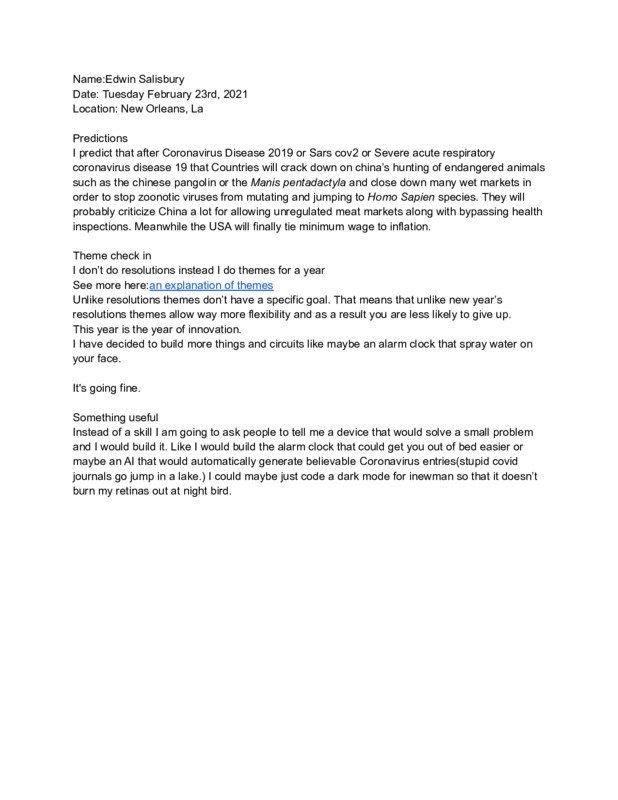 2021-02-23
2021-02-23Predictions and themes
It is about my predictions for the future of the world -
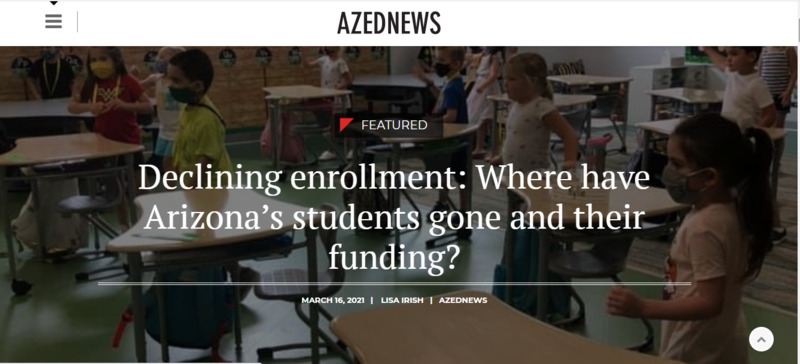 2021-03-16
2021-03-16Student enrollment is declining...where have Arizona Students gone?
This article highlights the declining enrollments of students in Arizona and their absence, so too does the funding disappear. According to the featured article, the combination of an approximate loss of 10% percent of the student population coupled with a drastic cut in the funding levels has significantly impacted the financial operations and organization of public school districts. The enrollment loss is mostly concentrated on the elementary levels, yet a notable loss of enrollment in high schools is of some concern. Declining enrollment not only affects the students' ability to develop important critical thinking and life skills, but in-person instruction should aid the student in recognizing the workload that comes with advanced degrees and education. Another option offers students the ability to learn through the hybrid instructional model. -
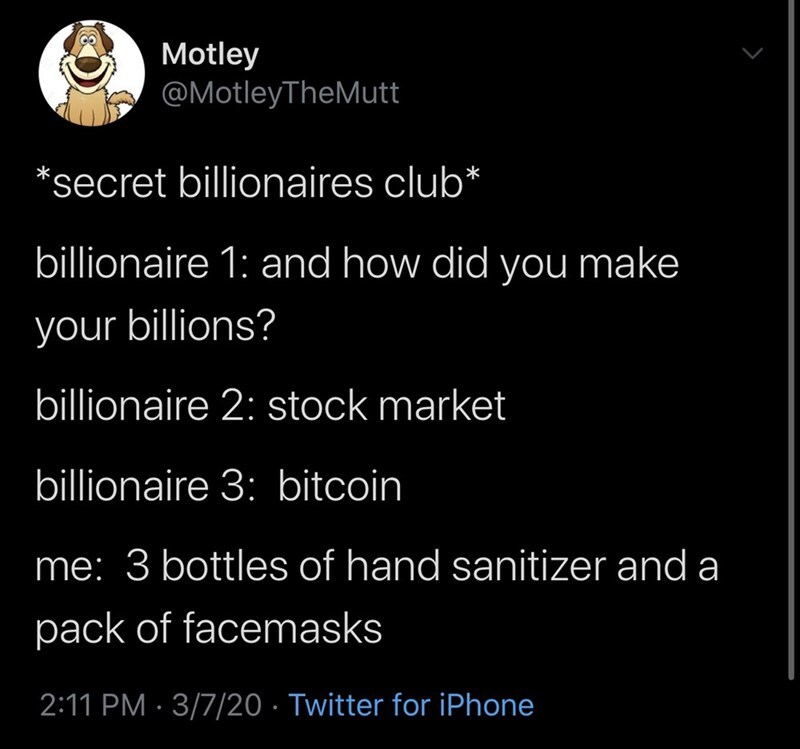 2020-09-03
2020-09-03The Billion Dollar Hand Sanitizer
This meme is bringing light and making fun of the price inflation of relatively cheap common items. Once the pandemic officially made its way into America, there has been a shortage of items such as Hand Sanitizer, Masks, Toilet Paper, and other common essentials. This has led to the price inflation in these goods. At one point during the Pandemic, I found a pack of six Purell Hand Sanitizers going for more then 80 dollars. -
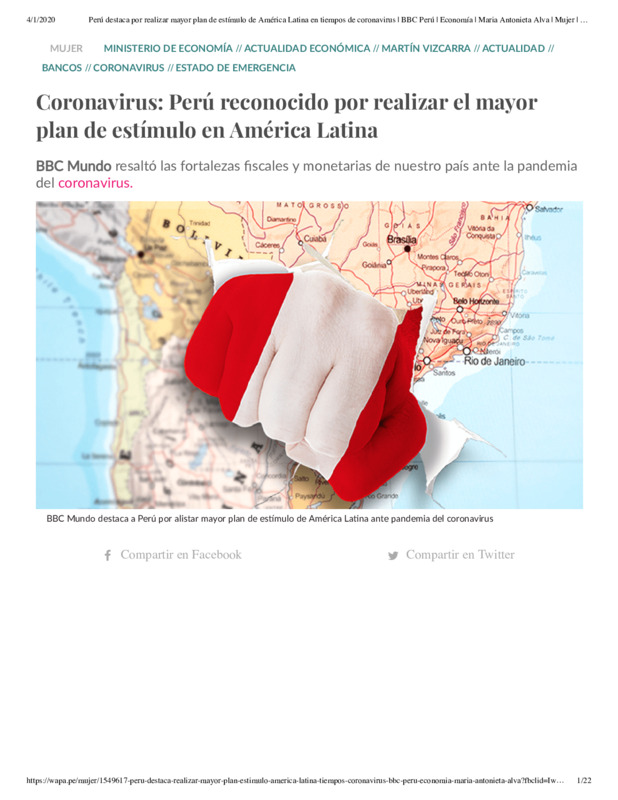 2020-04-01
2020-04-01Coronavirus: Perú reconocido por realizar el mayor plan de estímulo en América Latina
BBC Mundo resaltó las fortalezas fiscales y monetarias de nuestro país ante la pandemia del coronavirus.
